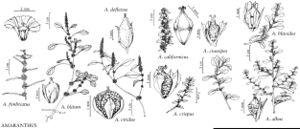Amaranthus californicus
in W. H. Brewer et al., Bot. California 2: 42. 1880.
Plants annual, glabrous. Stems prostrate, whitish or tinged with red, much-branched from base, 0.1–0.5 m, rather fleshy. Leaves: petiole 1/2 or less as long as blade; blade pale green, veins prominent, obovate, spatulate, or oblanceolate to linear, 0.3–2 (–3) × 0.2–1.5 cm, base cuneate, margins entire, plane or slightly undulate, apex obtuse to subacute, with prominent mucro. Inflorescences axillary clusters borne from bases to tops of plants. Bracts of pistillate flowers linear, 0.5–1 mm, ± equaling tepals. Pistillate flowers: tepals 1–3, narrowly lanceolate, unequal, usually with only 1 well-developed tepal, largest 1–1.2 mm, apex acute to acuminate; stigmas 3. Staminate flowers intermixed with pistillate; tepals (2–) 3; stamens 3. Utricles subglobose, 1–1.2 mm, smooth or wrinkled (especially in dry plants), dehiscence regularly circumscissile or tardily dehiscent. Seeds very dark reddish-brown, lenticular, (0.6–) 0.7–1 mm diam., shiny.
Phenology: Flowering summer–fall.
Habitat: Seasonally moist flats, shores of water bodies, waste places, other disturbed habitats
Elevation: 0-2800 m
Distribution
Alta., Sask., Calif., Idaho, Kans., Mont., Nebr., Nev., Oreg., S.Dak., Tex., Utah, Wash., Wyo.
Discussion
Selected References
None.
